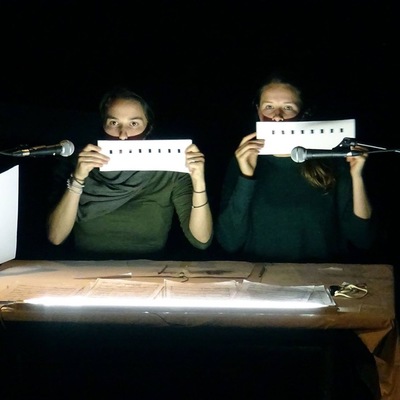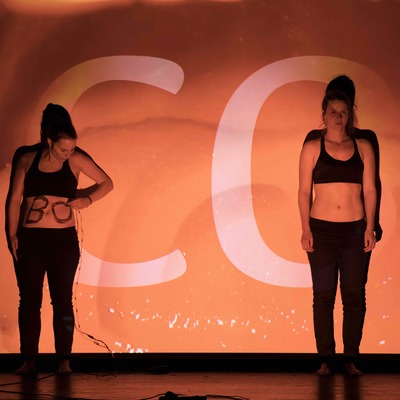Discover! Julian Kämper selected saxophone duo eventuell. from the growing pool of neo-profiles. Their distinctive element is a multi- sensorial approach, dwelling on their own artistic existence as well their own body.
He talked to the two saxophonists and performers Manuela Villiger and Vera Wahl about their aims and ideas.

Julian Kämper
In 2015, instrumentalists Manuela Villiger and Vera Wahl founded their duo “eventuell.” as a saxophone duet. But the saxophone being a relatively young instrument and the duo line-up atypical, the classical repertoire turned out to be rather limited. For this reason, eventuell. started collaborating intensively with mostly young and international composers such as Yiran Zhao, Loïc Destremau, Mauro Hertig and Victor Alexandru Coltea. Alternatively, they create their own compositions.
Their programmes are often visual, physical and scenic: comprehensive performances, whose aim is not to be perceived and enjoyed only auditorily, but on a multi-sensorial level. In their projects, the two performers, who studied together in Lucerne and Zurich, incorporate extra-musical contexts and repeatedly focus on their artistic existence and their own bodies.
Manuela Villiger Beat for two soprano saxophones, video and electronics, eventuell., UA 2020
The developed concert formats the duo creates are far from commonly taught and so to speak conventional musical practices. I asked myself about the impulses and reasons for sharpening one’s own artistic profile this way and arranged to talk with Manuela Villiger and Vera Wahl.
Your repertoire includes pieces with live electronics, video and performative elements. You exhaust the sound and playing possibilities of the saxophone and often treat the instrument in unusual ways – for example in Julian Siffert’s composition “Grammars of Crisis”. What is it like to not only use the saxophone but also sensors, everyday objects or your body as instruments?
VW: It’s an automatically happening process if you are interested in this kind of music. We can take our musicality from playing the saxophone and transfer it to performative elements. It doesn’t matter what you have in your hands. The main thing is that you like to express yourself with your body. The piece actually features both, passages with and without an instrument.
Julian Siffert Grammars of Crisis for soprano saxophone, alto saxophone, video and electronics, eventuell., UA 2019
In this piece, you’re practicing sports, prepare your instruments. In other cases, you operate all kinds of electronic devices. Are you not entering foreign territory?
MV: With the use of electronics, it was and is “learning by doing” as well as “trial and error”. It’s more a question of aesthetic means. We spent hours, days, weeks practicing the saxophone and learning all its techniques. If we have to reproduce something exactly, then the saxophone is a vehicle, as we’re 99% sure of what will happen if we do this or that. But in certain pieces, these aesthetics are not in demand, it’s precisely about not having everything under control. We use this contrast consciously: we do have a tool with which we can execute something very precisely, but we don’t always want to use this – otherwise it loses its expressiveness.
VW: In the first part of “Grammars of Crisis”, when the video with our sports exercises is playing, we play what we hear, doubling the soundtrack, so to speak. The instrument serves the purpose there as we would not be able to reproduce this any instrument other than the one we know best.
Making individuals with differences visible on stage
Speaking about loss of control: Why do you expose yourselves to unpredictable and physically demanding situations during some performances?
MV: This focus on being an individual is very important for us. When I personally go to a concert, I first see a person in his role as a musician. It fascinates me to hear someone breathe or to observe how they move while playing, which is also how I notice that one musician is different from another. In a classical concert, however, this is usually omitted as much as can be, it’s all about the sound result, which is supposed to sound like it’s written on the score. We want to show that we are all individuals with differences on stage.
VW: The different kinds of limits is actually the main theme of our “ eventuell. limit” programme. We are not concerned with playing everything as perfectly as possible and concealing everything that is not. All performers are human beings and not machines, so mistakes and imperfections are part of them and of the exciting things of their performances.
Manuela Villiger augenBlick for two amplified soprano saxophones, eye-blink sensors, video and electronic sounds, eventuell., UA 2019
In your own compositions, you often focus on your own bodies or body parts and eyes or feet become visual and musical material. Is that a strategy to put yourself in the spotlight as a performer?
MV: It’s not about self-staging, but rather an exploration of the physical conditions we carry as human beings. Which brings us to the subject of individuality: What distinguishes me from others? It is obviously the body. This has been a theme for us for a long time and we want to transfer it into our performances and concerts, that’s why some pieces contain video sequences showing parts of our bodies.
Vera Wahl foot prints for two alto saxophones, video and tape, eventuell., UA 2020
Emotional statements – political discourses
You also describe your concerts as “emotional statements” and “political discourses”. Can you explain further?
VW: We invest a lot of time in our projects, discuss a lot and ask ourselves questions about what we are doing. We then translate all of these – let’s say – philosophical themes and emotional aspects into our performances. We don’t necessarily choose some political topic and then give our opinion. We rather ask questions: These questions are sometimes very diffusely hidden in the pieces. Sometimes we also work with text elements, in order to encourage the audience to deal with certain topics.
MV: I believe that every contemporary musician most probably thought about what profit society gets from what he or she does? For me personally, the certainty that I am dealing with society matters justifies all the time invested in various projects. I know there are composers and musicians who are convinced that music stands for itself and that it doesn’t need extra-musical contexts. That’s not true for us. After concerts we often have interesting conversations with people who have interpreted our concepts quite differently from our original idea. Which is a nice confirmation for us, as this means that our performance has encouraged them to think about those concepts.
Julian Kämper

eventuell., Julian Siffert, Yiran Zhao, Loïc Destremau
concert series:
eventuell. connected21, 20.05.-01.06.2021 (Zurich, Basel, Olten, Baden, Lucerne): compositions by Lara Stanic und Mathieu Corajod
june 9th 2021, 8pm: eventuell.fern in musica aperta in Winterthur with works by: Felix Baumann, Emilio Guim, Mauro Hertig, Simon Steen-Andersen, François Rossé, Matthew Shlomowitz and Alex Mincek.
broadcast:
BR KLASSIK Horizonte, 06.05.2021, 22:05: da sein. Das Saxophon-Duo eventuell., author: Julian Kämper, Redaktion: Kristin Amme
neo-Profiles: eventuell., Manuela Villiger, Vera Wahl, Mauro Hertig, Victor Alexandru Coltea, Lara Stanic, Mathieu Corajod, Simon Steen-Andersen, Mauro Hertig

